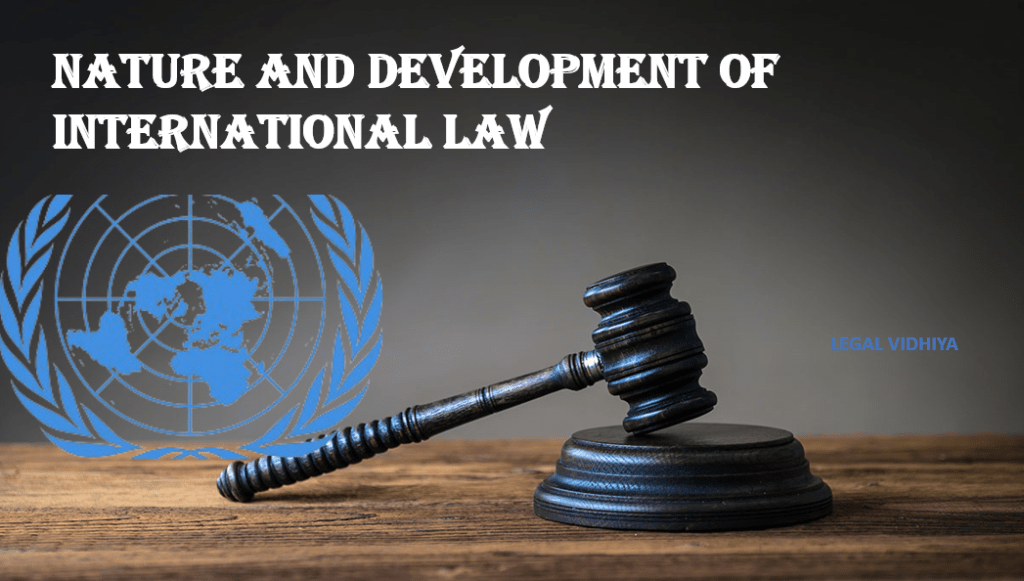
This article is written by Nada Mohamed of Al Azher University Department Sharia and Law, an intern under Legal Vidhiya
ABSTRACT
In modern times, international law has developed considerably. International institutions have been established to regulate relations of all kinds, whether economic, political or scientific, and also to resolve disputes between States. International treaties have been adopted to protect human rights, the environment, the fight against terrorism and other global issues. With the rapid development and multiplicity of issues and challenges posed by international relations, economic development, armed conflict and human rights, the need to develop an international legal system based on rules and principles to regulate such relations and resolve disputes between States is evident. In keeping with technological development and globalization, international law faces new challenges such as dealing with the Internet, cyberattacks, climate change and illegal migration. Thus, international law continues to evolve and adapt to meet the international community’s changing needs
Keywords: International law, custom, international treaties, Development, binding nature and future challenges
INTRODUCTION
International law is a crucial field in the study of international relations and the legal interaction between states. The history of the development of international law dates back many centuries as ancient societies began to establish rules and conventions for coexistence and mutual interaction. The importance of international law has increased in modern times with the expansion of international relations and increased communication and interaction among States, So international law plays a vital role in regulating international relations and achieving peace and justice in the world and as issues continue and evolve, the international community looks to develop and enhance international law to meet future challenges.
OBJECTIVES
This article addresses the nature and development of international law through the
analytical and descriptive approach to the relevant laws and the analysis of jurists’
opinions as well as the analysis of articles, magazines and books.
Therefore this research work focuses on:
1- Definition of international law
2- Nature and legal character of the rules of international law
3- Development of international law
5- Sources of international law
6- Challenges for the future implementation of international law
NATURE AND DEVELOPMENT OF INTERNATIONAL LAW
At first, we have to differentiate between two kinds of laws:
1- privet international law
2- public international law
The definition of private international law is Private International Law describes the body of law surrounding which law governs when there is a conflict between citizens of different countries. In common law jurisdictions, it is sometimes known as “conflict of laws.”[1]
It is clear from this definition that this law concerns States and persons. It is one of the legal branches that contains a collection of articles and legislative provisions and aims to regulate the interaction between domestic and foreign individuals in the sense of how the law applies to nationals of the State and to individuals who come to it from other States. What distinguishes it from general international law is that it applies to persons other than general international law applies to international organizations and States.
For example, a marriage contract concluded between an Indian and a French is of an international nature because it is linked to the State of India through the nationality of the husband and the State of France through the nationality of the wife.
Now I will move on to the definition of general international law, There are two directions for defining this law: one narrows in the area of this law and the other expands in its field.
FIRST THE NARROW DIRECTION: It is defined as the law of nation.[2] or as a set of rules and principles binding on civilized States in their mutual relationship[3].
It is clear from this definition that only States can be persons of international law, if international law is based solely on States and in no way relates to individuals.
SECOND EXPANDED DIRECTION: Black defines it as: those laws that govern the legal relations between nations as well as the conduct of nations and international organizations. [4]
It is clear from this definition that relations organized by States have expanded to regulate organizations’ relations with each other as well as their relationship with States. Hence the distinction of international law with its universality, its basic rules and principles must be applied everywhere.
Hence it is worth noting a very important point, namely the statement that international law lacks the legislative, judicial and executive power and these authorities are the fundamental ingredients of the law’s existence and implementation.
But the comparison between the international community and the internal society of States is unjust. The internal society in which individuals are subjected to the highest authority is the Government of the three authorities referred to, whereas the international community does not have such subordination, but there is coordination among its members of sovereign States.
The process of law-making in the international community is based on conferences that draw up normative conventions such as the United Nations Conference on the Law of the Sea, which developed the Convention on the Sea and others. Also, there are a lot of laws that came from international practice (international custom) and will be talked about in detail later.
As for international justice, it was represented by the International Court of Justice and regional courts. Although the international judiciary is less structured and binding than the internal judiciary, it is an undoubted authority.
– Nature and legal character of the rules of international law
Having spoken about the definition of international law, I will turn to the nature and legal character of international law, International law is a special nature different from domestic law. International law consists of sovereign States, not individuals, and any restriction of a State’s powers is an explicit threat to its sovereignty.
When speaking of the binding force of the rules of international law, reference should be made to two doctrines: –[5]
1- Voluntary Doctrine 2- Thematic doctrine
Frist Voluntary Doctrine: Proponents of this doctrine believe that international law is a result of the will and satisfaction of States to abide by its provisions, Supporters of this doctrine are divided into two opinions:
a– Self-determination of will: The law here is effectively and necessarily linked to the will and derives its compulsory power. The State is bound by the law only by its will.
It is clear that the compulsory force of international law depends entirely on will. A State cannot be compelled to abide by any law without its will.
b– United Will: The views of this doctrine can be summed up in the fact that the law is passed by a supreme authority, and since this power is lacking in the international community, the collective will of its members replaces this power, which is beyond the individual will of States
Second Thematic doctrine: The proponents of this doctrine tend to suggest that the basis of the binding force of the rules of international law is beyond the control of the will because this will be subject to change, and they split into two opinions:
a– First opinion of the two professors Kelsen and Verdross they said: “Every legal system is a fundamental rule governing its provisions, namely the sanctity of the agreement and the fulfillment of the Covenant.”
This is based on the important basis that a State must abide by any covenant or agreement it makes with another State and comply with its obligations in international organizations.
b– Supporters of the second opinion argued that the basis of international law is a Fait social that means (restrictions imposed on members of the group). These restrictions are transformed by legal rules and acquire the obligation that members of the group must submit to them in order to preserve the community’s life and survival.
After presenting these views, it can be argued that the basis for binding international law in the opinion of the majority of its scientists is the general consent of States to be bound by its provisions, whether that consent is express, implied or presumed.
Development of the international law
International law is one of the oldest subjects in the world of law and is a thorny subject dating back thousands of years
In ancient times, international law was based primarily on customary and religious law and was governed by family conflict and violence.
With the beginning of modern times in the seventeenth century, international law is gradually becoming what we know today. States were regarded as independent entities and through their sovereignty.
In the eighteenth century, bilateral and inter-independent treaties such as the Westphalia Charter, which ended the Thirty-Year War in the seventeenth century and also ended the religious dispute between Europe’s disputing States, called for a settlement between the Contracting Parties and recognition of the sovereign rights of States
At the beginning of the twentieth century, international law saw the establishment of a number of international organizations and courts, which increased the importance of international law, among them the United Nations and the European Union, as well as the International Court of Justice, which played a major role in the control and resolution of international disputes.
Development of International Law in India: India’s contribution to international law cannot be overemphasized, especially in the fields of humanitarian law, environmental conservation, and security, technology and trade laws. At the same time, to meet its international obligations, India has harmonized many of its domestic laws with international standards and norms. People’s rights, environmental rules, intellectual property rules, arbitration laws, trade laws, and space laws are important in this exchange. Implementing international law in India can be viewed either from the viewpoint of the position of each government or from the standpoint of each area of law. [6]
Thus, international law reflects the tremendous changes that the world has witnessed over the ages and continues to face many challenges and differences in its understanding and application, yet international law remains the basis for building and cooperating the nations and achieving lasting peace.
– Sources of international law
The first source of international law is custom: Custom was and continues to be a source of international law and of great importance
It is defined as: Customary international law consists of rules that derive from “a general practice accepted as law” and exist independent of treaty law. Unlike treaties, customary international law is not written
To prove that a certain rule is customary,
1) there must be objective evidence of state practice
2) the international community must believe that such practice is required as a matter of law – this subjective element is known as opinio juris [7]
So custom is the international custom that is considered to be a general law that is evidenced by tension of use.
The second source International treaties
It is defined as “A treaty is an agreement whereby two or more states establish or seek to establish a relationship between them governed by international law
Treaties and conventions are one of the most important sources of International Law. These conventions can be multilateral or bilateral. Multilateral conventions relate to the treaties which formulate the universal or general application of the law. On the other hand, bilateral conventions are those which is formed exclusively by two states to deal with a particular matter concerning these states.
They are voluntary and cannot bind non-signatory to it, however, there are certain exceptions to it that is if any rule forms part of the Jus Cogens norm as they are part of the accepted principles of International law and every state has a peremptory duty of not breaching them due to their erga omnes obligations. (owed to the whole world)[8]
An international treaty may have a considerable division in establishing the existence of its rule formed earlier during an independent process of development, but the treaty may guarantee the right to withdraw, formulate reservations or, in some cases, review.
The third source general principles
Most modern jurists accept general principles of law as common to all national legal systems, in so far as they are applicable to the relations of States. There are fewer decided cases in international law than in a municipal system and no method of legislating to provide rules to govern new situations. It is for such a reason that the provision of ‘the general principles of law recognized by civilized nations [9]
These general principles must be derived in such a way as to reflect the principles and concepts recognized by all civil systems of law and supported by article ninth
of the International Court of Justice’s statute, which requires that judges be selected on the basis of representation of the world’s major civilians and principal legal systems.
Undoubtedly, there is difficulty in identifying the sources of international law at the present time, although this is a sign of the development of international law rather than of its weakness.
Now I’m moving to a very important part: Challenges for the future implementation of international law And these are some examples of it.
The first of these challenges is nuclear disarmament: In the future, international law must put an end to the possession of such weapons, especially in the light of this dangerous development of technology, which must dominate the development of such weapons and require international cooperation and the drafting of treaties based on diplomatic commitment.
The second challenges are environmental conservation It’s just as important as the previous challenge. The conservation of the global environment requires policies and regulations that protect the environment and regulate the sustainable use of natural resources.
The third challenges are digital world This is one of the most serious challenges as it falls under one of the most important topics of concern to the world, namely the protection of data. With the rapid development now taking place from the development of systems and some companies seeking to exploit the personal data of customers, international law must be constantly developed to keep pace with these rapid developments and put an end to these breakthroughs and exploitation by some companies.
CONCLUSION
As a result, The development of international law throughout history has been the result of the growing need to regulate relations between the Joules and to resolve conflicts in a sound and just manner over time and the growing challenges of international law continue to evolve to face these challenges and achieve peace and justice in the world.
REFERENCES
1- Westlake, international law, vol 1. 1940
2-Briely J I. the Law of Nations Wedlock, International law, 1936
3-Black, S Law Dictionary, 816, 6th ed. 1990
4- Dr. Salah Abdul Badi Shalab, Brevity in international law, 51
5- https://libguides.law.ucla.edu/privateinternational > (last visited Seb.2, 20023)
6- < https://blog.ipleaders.in/development-international-law/> (last visit SEP 3, 2023)
7- < https://unimelb.libguides.com/internationallaw > (Last visit sep 4,2023)
8- < https://blog.ipleaders.in/sources-international-law/#Convention_as_a_source_of_International_Law > (last visit Sep 4, 2023)
9- < https://blog.ipleaders.in/sources-international-law/#Convention_as_a_source_of_International_Law > (last visit Sep 4, 2023)
1UCLA School of law hugh & hazel darling law library < https://libguides.law.ucla.edu/privateinternational > (last visited Seb.2, 2023)
2 Westlake, international law, vol 1. 1940
3 Briely J I. the Law of Nations Wedlock, International law, 1936
4 Black, S Law Dictionary, 816, 6th ed. 1990
5 Dr. Salah Abdul Badi Shalab, Brevity in international law, 51
6 Ipleaders < https://blog.ipleaders.in/development-international-law/> (last visit SEP 3, 2023)
7 The University of MELBOURNE < https://unimelb.libguides.com/internationallaw > (Last visit sep 4,2023)
8 IPleaders < https://blog.ipleaders.in/sources-international-law/#Convention_as_a_source_of_International_Law > (last visit Sep 4, 2023)
9 IPleaders < https://blog.ipleaders.in/sources-international-law/#Convention_as_a_source_of_International_Law > (last visit Sep 4, 2023)




0 Comments